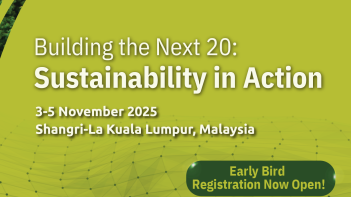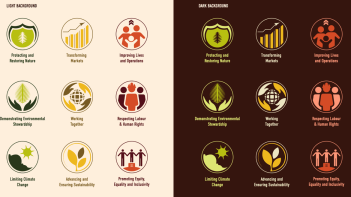The organisation condemns human rights violations but reminds all parties to consider the workers and families impacted by the blanket decision
Kuala Lumpur, 2 October 2020: The Roundtable on Sustainable Palm Oil (RSPO) acknowledges the U.S. Customs and Border Protection’s (CBP) Withhold Release Order (WRO) on materials imported to the United States from Felda Global Ventures Holdings (FGV Holdings) but expresses reservations about the impact of the order on smallholders and workers.
The RSPO has zero-tolerance for the practices described in the CBP Press Release and the Associated Press article, and while these are not new issues, this is precisely why the protection of human rights has been so deeply embedded in the RSPO Principles and Criteria (P&C) 2018.
Earlier this year, the RSPO suspended the certificate of FGV Holdings for violations at its Kilang Sawit Serting mill. We have ceased processing the certification of all other uncertified units until the directives as set out in the Complaints Panel’s decision dated 28 November 2018 are implemented fully.
RSPO’s Chief Executive Officer Designate, Beverley Postma, said, “Human rights violations remain one of the toughest challenges in commodity supply chains. We condemn the use of forced or child labour or any other form of modern slavery on any members plantation, certified or uncertified.
“We firmly believe that our new suite of standards, adopted by our Members in 2018, remains the best system to help eradicate these issues and we are committed to supporting a process of continuous improvement. The mission of the RSPO is to transform markets to make sustainable palm oil the norm,” she said.
“We are so much more than an industry watchdog. It is our individual and collective conviction that we should work together to deliver positive, sustainable impacts, not just for the rainforests and endangered species within them, but for the people and communities who rely on this crop for their livelihoods and futures.”
More than 112,000 settler families, mainly FELDA settlers, rely on oil palm cultivation and FGV Holdings to support their livelihoods. And roughly two-thirds of FGV Holding’s Fresh Fruit Bunch (FFB) supply comes from FELDA smallholders. This order by the U.S. CBP will not only penalise those that have allegedly perpetrated human rights violations, but impact the ability of those innocent to earn a living.
The RSPO calls on the U.S. government and CBP to work with all relevant partners to conduct a full risk assessment of the impact any sanctions may have on these vulnerable populations and to work jointly with the Malaysian government towards a positive outcome that allows both countries to meet their commitments to the UN Sustainable Development Goals. For this reason, the RSPO will uphold its existing sanctions on FGV and continue to work with them to improve their ability to meet our exacting standards on human and social protection.
The current status of FGV’s certification as of 30 September 2020 are as follows. On 13 January 2020, the RSPO Complaints Panel directed the suspension of the P&C certification processes for all uncertified units of FGV Holdings and for the Secretariat to instruct the Certification Body to reimpose the suspension on FGV Holding’s Kilang Sawit Serting mill for non-compliance of the Complaints Panel’s Decision, dated 28 November 2018. This matter is now at the Post Complaints Monitoring phase and remains under the purview of the Investigation and Monitoring Unit (IMU), with regular updates on FGV’s compliance furnished to the Complaints Panel.
The organisation and its membership remains committed to transparency and accountability, and will continue to publish on its website the relevant developments pertaining to this matter. Further, we strongly encourage any organisation or agency that has additional information about human rights violations or violations of the RSPO P&C found on RSPO member plantations to submit a formal complaint through our Complaints System.
About RSPO:
The Roundtable on Sustainable Palm Oil (RSPO) was formed in 2004 with the objective of promoting the growth and use of sustainable oil palm products through credible global standards and engagement of stakeholders. RSPO is a not-for-profit, international, membership organisation that unites stakeholders from the different sectors of the palm oil industry including oil palm producers, palm oil processors or traders, consumer goods manufacturers, retailers, banks and investors, environmental or nature conservation NGOs, and social or developmental NGOs.
This multi-stakeholder representation is mirrored in the governance structure of RSPO such that seats in the Board of Governors, Steering Committees and Working Groups are fairly allocated to each sector. In this way, RSPO lives out the philosophy of the “roundtable” by giving equal rights to each stakeholder group, facilitating traditionally adversarial stakeholders in working together to reach decisions by consensus, and achieving RSPO’s shared vision of making sustainable palm oil the norm.
The seat of the association is in Zurich, Switzerland, while the secretariat is currently based in Kuala Lumpur with satellite offices in Jakarta (ID), London (UK), Zoetermeer (NL), Beijing (CN) and Bogotá (CO).
For further information, kindly contact:
| RSPO Communications Team |
Keep reading
Indonesia National Interpretation Public Consultation: 8 August 2025 – 7 October 2025
Indonesia National Interpretation Public Consultation: 8 August 2025 – 7 October 2025
Call for Expression of Interest: Guatemala National Interpretation Task Force for 2024 RSPO Principles and Criteria (RSPO P&C)
Call for Consultants: Independent Evaluator for Compensation Plans and Reviewer for Drainability Assessment Reports

Announcement on 22nd General Assembly (GA22) of RSPO Members
Extension of Licence Validity and Carry-Over Credits Mechanism for Certified Independent Smallholder (ISH) Groups

RT2025 Early Bird Registration Now Open!




